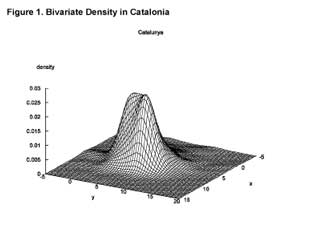Testing Models of Distributive Politics in Multiparty Systems: The Case of Spain

Elena Jarocińska, in her most recent studies, focused on an extension of an empirical literature on political economy of intergovernmental transfers to multiparty systems, which are typical for most European countries.
The measurement of swing and loyal regions is the way this paper differs from the others. Author proposed two new methods of estimating the number of swing voters which captured multiple parties from individual survey data. The first method estimates densities at the cutpoints, where a voter is equidistant to competing parties. The estimation involved bivariate densities at the cutpoints on the left-right and nationalist dimensions in order to take into account the bi-dimensionality of Spanish politics for three party regions. Additionally Elena Jarocińska applied the method that counts voters with similar likelihoods of voting for parties in the regions. As a result, the likelihoods of voting are estimated with the multinomial probit technique and included additional controls for the nationalist sentiment.
As a result of applying the database BADESPE (state subventions series) and the data from Spanish Institute of Statistics( economic and demographic controls), Elena Jarocińska found that political variables enter significantly into allocation of state subventions in Spain and that the magnitude of the effect is comparable to that of economic variables. Therefore, the loyal hypothesis is strongly supported by the analysis whereas it is not the case in terms of swing hypothesis. Conclusively, her results are in line with the explanation suggested by Cox and McCubbins (1986). Thus, the risk-averse incumbent prefers investing in loyal regions, where he knows better preferences and numbers of their supporters.
For the full text: click here.
